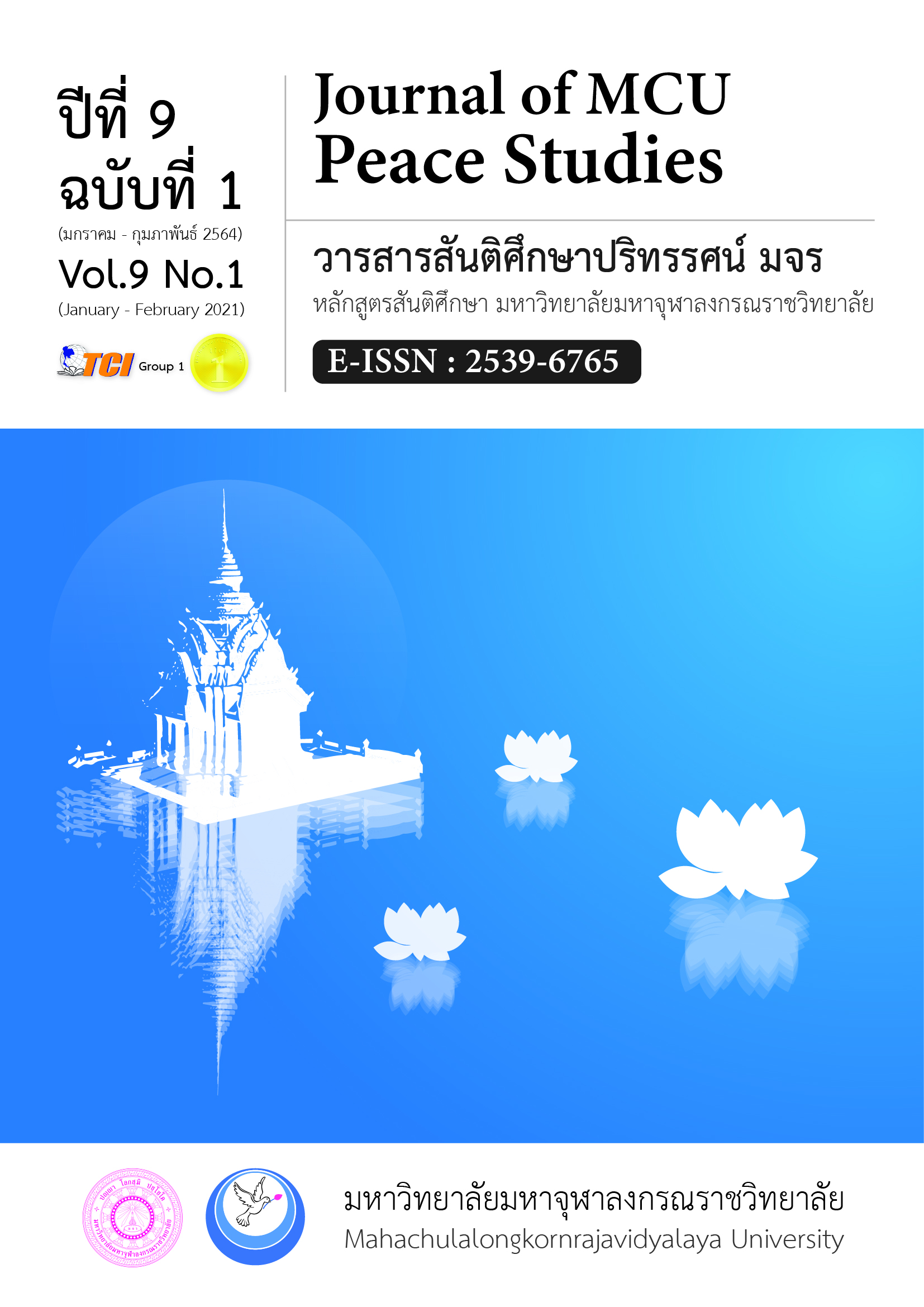ทศพิธราชธรรม: การศึกษาเชิงวิเคราะห์ วิจักษ์ และวิธาน
Main Article Content
บทคัดย่อ
บทความวิจัยครั้งนี้มีวัตถุประสงค์เพื่อวิเคราะห์ วิจักษ์ และวิธานทศพิธราชธรรม ผลการวิจัยสรุปได้ดังนี้ 1. ผลการวิเคราะห์ทศพิธราชธรรม พบว่า ทศพิธราชธรรม คือ ธรรมที่ผู้นำและผู้ปกครองรัฐ ตั้งต้นแต่พระเจ้าจักรพรรดิ พระมหากษัตริย์ตลอดจนนักปกครองโดยทั่วไปพึงถือเป็นข้อปฏิบัติมี 10 ประการ คือ ทาน, ศีล, การเสียสละ, ความซื่อตรง, ความอ่อนโยน, ความเพียร, ความไม่โกรธ, ความไม่เบียดเบียน, ความอดทน และความเที่ยงธรรม 2. ผลการวิจักษ์ทศพิธราชธรรม พบว่า ทศพิธราชธรรมมีความเหมาะสมที่จะนำมาใช้เป็นคุณธรรมสำหรับผู้นำโดยทั่วไปได้เพราะธรรมะที่พระพุทธเจ้าทรงตรัสสอนมีความเป็นสากล และทศพิธราชธรรมเป็นหลักจริยธรรมที่สามารถพัฒนาคุณภาพชีวิตผู้นำได้เหมาะสมกับยุคศตวรรษที่ 21 และ 3. ผลการวิธาน พบว่า ทศพิธราชธรรมสามารถประยุกต์ใช้ได้ดีกับผู้นำกระบวนทรรศน์หลังนวยุคสายกลางที่ใช้วิจารณญาณเป็นเครื่องมือนำไปสู่ผลอันเลิศคือการพัฒนาคุณภาพชีวิตตนเองและส่วนรวม
Article Details
ทัศนะและความคิดเห็นที่ปรากฏในบทความในวารสาร ถือเป็นความรับผิดชอบของผู้เขียนบทความนั้น และไม่ถือเป็นทัศนะและความรับผิดชอบของกองบรรณาธิการ ยินยอมว่าบทความเป็นลิขสิทธิ์ของวารสาร
เอกสารอ้างอิง
Amaritwarin, S., & Bunchua, K. (2015). Philosophy of Sufficiency Economy and Authentic Happiness According to Reality. SSRU Graduate Studies Journal, 8(2).
Bunchua, K. (2002). St. John's philosophy and religion, The first book. Bangkok: St. John's University.
Bunchua, K. (2002). Postmodern Philosophy, Concepts for the study of new plans. Bangkok: Duangkamon.
Bunchua, K. (2003). St. John's philosophy and religion, Third book. Bangkok: Thanbundit.
Bunchua, K. (2008). Ethics Handbook according to international academic principles. Bangkok: Chain Printing.
Bunchua, K. (2012). Problems and solutions regarding morality and ethics training (including morality), in Thailand from the perspective of Samuel Huntington. Research report. Bangkok: Suan Sunandha Rajabhat University.
Chareonwongsak, K. (2013). Mind Map. (11th ed.). Bangkok: Success Media.
Department of Religious Affairs. (1982). Tipitaka, Thai Language, Royal Version. Bangkok: Department of Religious Affairs.
Harimtepathip, M., Bunchua, K., & Phramahamakhawin Purisuttamo. (2015). Criterion of Truth According to Kalamasutta: An Analytic, Appreciative and Applicative Study. Rommayasan Journal, 13(3).
Harimtepathip, M. (2015). Postmodern Perspective in the Principle of Participation. Appreciative and Applicative Study. Rommayasan Journal, 16(3).
Harimtepathip, M. (2016). The New Paradigm of the Information Society for Good Governance. Journal of Buddhamagga, 1(1).
Jones, W.T. (1969). A History of Western Philosophy. New York: Harcourt Brace.
Office of the Royal Society. (2011). Royal Institute Dictionary 2011 Edition. (2st ed.). Bangkok: Nanmeebooks.
Phra Dhammapidok (P. A. Payutto). (1995). Dictionary of Buddhism. (9th ed.). Bangkok: Sahadhammika print.
Phrakhruthammasatkhosit, Harimtepathip, M., & Bunchua, K. (2017). The Moderate Way of Hermeneutics in the Noble Eight-Fold Path: An Analytic, Appreciative and Applicative Stud. Journal of Graduate Studies Review, 13(2) 110-119.
Sangsriin, P. (2008). The Application of the Ten Royal Virtues of Thai King: A Case Study of King Rama IV. (Master’s Thesis). Graduate School: Mahamakut University.
Srisirirung, S., & Bunchua, K. (2017). Buddhism and Science: An Analytic, Appreciative and Applicative Study. Journal of Graduate Studies Review, 13(2).


